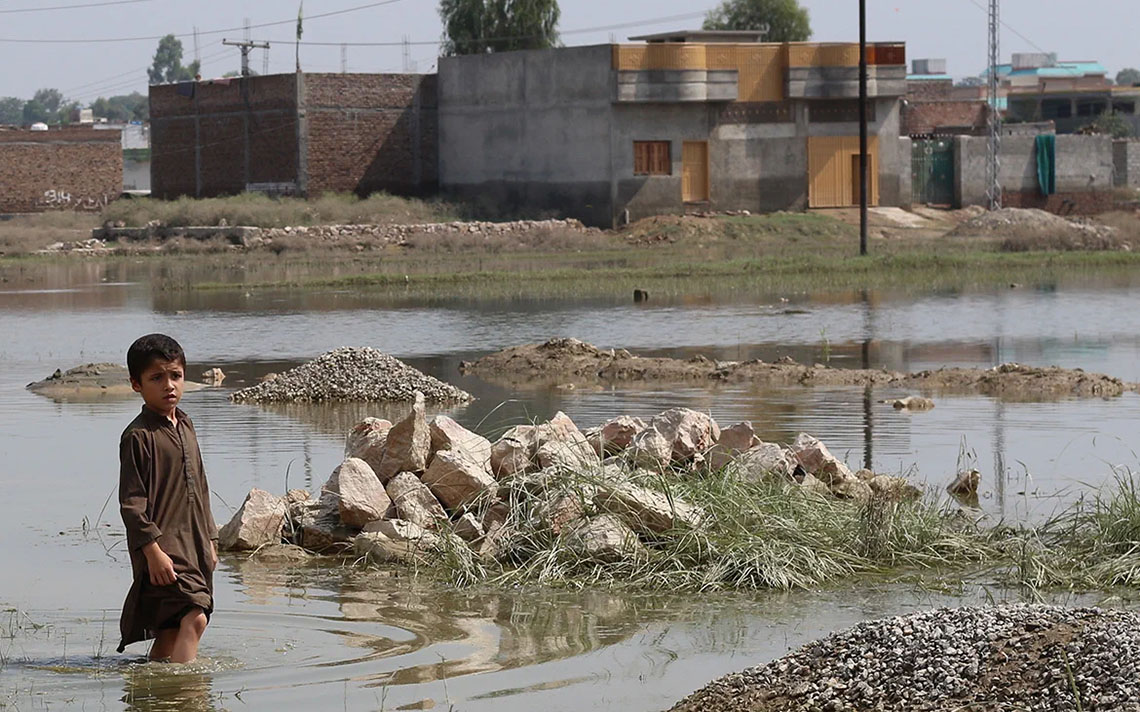
What garners our empathy? What drives us to take action? What does inaction signify? These questions were among many that flooded my mind as I mulled over my reaction to the devastating floods that recently hit Pakistan.
My initial response was subdued. Having lived in Pakistan for the bulk of my life, I knew flooding in the monsoon season was not unusual. But as the scale of the catastrophe unfurled and my social feed became inundated with videos of families being washed away by merciless waves, I realized that this was a disaster of Noahic proportion.
Human activities driving climate change led to the severity of the floods, and this knowledge gave rise to feelings within me of deep unsettlement, culminating in the writing of this blog.
The ‘perfect’ flood
April and May saw a sweltering heatwave in Pakistan, with temperatures soaring to 51 °C in some parts. This triggered a massive glacial melt into the Indus River. The heated air retained more moisture, resulting in torrential rain and a prolonged and intense monsoon season, with the provinces of Baluchistan and Sindh receiving five times more rain than average. This also coincided with low air pressure in the Arabian Sea. Together, this created a trifecta of factors that resulted in brutal flooding that Pakistan’s poor infrastructure and drainage could not withstand.1
When numbers don’t startle us
Human-induced global warming played a significant role in the flooding that has so far caused the death of over 1400 people, displaced 33 million from their homes, destroyed 18,000 km2 of cropland and killed 750,000 livestock.2,3 This is not to mention the damage to infrastructure amounting to around $30 billion, the spread of water-borne diseases, and the lack of access to urgent medical care for over 650,000 pregnant women.4
I have intentionally painted this picture with numbers. Astronomical figures like these are difficult to compute and too painful to comprehend. When we are constantly confronted with travesties on the news, statistics start to wane in their power to move us. This means that making a concerted effort to consider the stories behind the figures is left to the individual. I chose to swim against the tide of climate fatigue and feel the loss.
My climate change epiphany
Overcoming my autopilot response of passivity was not straightforward; I had to tap into my emotions.
A response to a climate change disaster has a different color to that of a natural disaster. It manifests as an amalgamation of emotions that resonate at a personal level. Sadness, anger and guilt intertwine. This event was not an incidence of freak weather but an occurrence that was made significantly worse because the climate had warmed by 1.2 °C.3
Suddenly, climate change no longer felt like a topic for documentaries with apocalyptic qualities. It became clear to me that climate change is also a human rights issue, and it took a staggering scale of loss close to home for me to realize it.
The elephant in the room: Climate injustice
When the ramifications of our behavior towards the planet are laid bare in tragedy, the element of climate injustice must not be glossed over. The carbon footprint of the people affected by the floods, as well as Pakistan's global greenhouse gas emissions, are negligible compared to those of the wealthiest nations.
Accountability plays a crucial role when proposing solutions to this global crisis and must not be avoided because it makes us uncomfortable. Whether it is fossil fuel companies, wealthy nations, politicians, the rich, or society at large, consigning equal responsibility to everyone is unfair5; however, our collective efforts are what will decide the trajectory of climate change.
Looking up and looking ahead
Celebrating progress and seeking opportunities that promise a better future are the first steps in shifting gears towards optimism. This begins from our circle of influence.
In a bid to focus on the bright side, it is important to remind ourselves that there are people who care, and I am reminded of this every day at Scientific Group. As a medical communications agency, we are aware of the environmental challenges facing our industry, and this fuels us with purpose and drives us to action.
Whether that action is pledging to become net zero by 2025, setting science-based targets for greenhouse gas emissions, promoting ‘green’ travel, encouraging the use of electric cars, or prioritizing recycling, sustainability is coded into our DNA because we care. It gives me great joy to say that we are sending this month’s charity donation to the Red Cross Pakistan Floods Appeal who are helping affected people on the ground.
We take our climate commitments very seriously. Caretakers of the Earth is a role that each member of our team identifies with, and it is at the heart of our vision to lead the medical communications industry into a sustainable age.
Big thinking indeed, but that is what the AS&K Comms part of Scientific Group is all about.
References